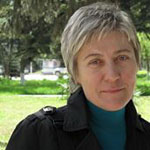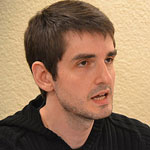Yerevan on Saturday was the site for an unusual meeting. Particularly unusual was the fact that meeting participants discussed conflict — but not the Armenian-Azerbaijani conflict. Apparently, there are conflicts in the world that are not connected to Karabakh. And these problems in every sense are closer than we, the Armenian audience, imagine.
Thus, the capital of Armenia was considered convenient for representatives of the civil societies of the conflicting countries (recognized and not so much) in the region. On May 3, public figures, human rights activists, journalists, and bloggers from Georgia, Abkhazia, and South Ossetia gathered at the Imperial Hotel in Yerevan for the civil hearings on "The role and influence of civil society in the peace-building process." The event, organized by the Caucasus Center of Civil Hearings (Georgia), took place within the scope of the joint EU/UNDP program COBERM (Confidence Building Early Response Mechanism).
Speakers and panelists unexpectedly forbade the media from covering the event, agreeing to talk to the press after the event, though the opinions in subsequent interviews did not contradict what they said at the hearing. Epress.am is publishing abstracts of the speakers' remarks, which were provided by the organizers.
Theses
Irina Yanovskaya, head of Journalists for Human Rights NGO (Tskhinvali)
Forget everything that has happened and don't give in to your emotions — that's easy to say. But what about in real life? How to deal with the pain of losing friends and relatives during the war?
According to the 1998 census, Georgian-Ossetian families accounted for the highest percentage of mixed marriages in the USSR.
In South Ossetia, they don't accept donors who come prepared with their programs, while those who really want to work in South Ossetia, as a rule, take into account the ideas of local NGOs.
It would be nice also if donors didn't suspend funding for peacekeeping programs, since such programs must be long-term — at least for 3 years.
Civil society in the Republic of South Ossetia was shaped over 20 years, under conditions of constant war with Georgia. Nevertheless, it should not be assumed that the country has a sufficiently developed civil society. Our state was created due to civil society and the will of the people.
In the country today there is real opposition — as accepted in the development of democracy.
From an interview with Choice is Yours, Ossetia party leader Alan Jusoev: "We have no opposition that calls for a return to Georgia, but there are opinions that South Ossetia could and should engage in active dialogue with Europe and the US, as an independent state. There is an opinion that South Ossetia should be reunited with the North, as part of the Russian Federation…"
Projects of South Ossetia NGOs are supported only by foreign donors and foundations, and by a few Russians.
There is an opinion that the activities of NGOs have become a form of private business.
Among Georgian colleagues there are individual responsible journalists who always checked and continue to recheck the facts of events with Ossetian colleagues and only then publish their news stories.
For me, as for any citizen of South Ossetia, it's important what they call me, my city, and my country: it is mutual respect, which is the foundation for peace. If, however, Georgian colleagues don't do that, then in such cases from the beginning there can be not talk of peacekeeping.
Prior to 2008, NGOs of the parties to the conflict had countless meetings abroad, signed appeals with calls for peace, but what happened still happened, on the night of 08/08/08, and the whole world knew about it.
All political issues can be discussed only within the framework of formal negotiations at the state level, while civil society organizations under any circumstances cannot be subjects of international negotiations and foreign policy.
Georgia's civil society basically is unable to influence the decisions adopted by Georgian authorities and politicians.
Kadir Argun, reporter of the newspaper Nuzhnaya (Sukhumi): first time participating in a meeting in this format and is skeptical of peacemaking.
Peacemaking is in demand where there are conflicts. That is, we are talking about countries with a weak legal system, which in conflict settlement cannot rely on the legal framework or international law.
When our peoples talk about peacemaking they mean the kind of gatherings, which are referred to as public diplomacy. This comparison is inappropriate, since adopted at such gatherings were specific decisions that had legal significance and were binding. The peacemaking we are talking about today does not perform this function — it again must be carried out by law.
Peacemaking, which we face in various venues, during roundtables, is a search for compromise — sometimes losing steam and diverging from the main topic. It often carries a negative role for society. But we need results.
Our societies are woven of conflicts — between ordinary people; between society and government; property, family, ethnic, economic conflicts, and so on.
There are a great variety of peacekeeping NGOs in Abkhazia. Some exist on account of international grants, while others are supported by the government. Other categories of NGOs are very few in our country.
We can speak with Georgia only around one topic, which is recognition of the independence of Abkhazia and the recovery of the economy destroyed as a result of military aggression by Georgia.
NGOs are focused on projects of building trust, not having a foundation that could ensure such trust between peoples — the recognition of independence from Georgia, as well as recognition of Georgia's responsibility for the aggression.
Zviad Mchedlishvili, reporter with the public television broadcaster and Radio Liberty (Georgia)
The stronger civil society is, the less its dependency on the state and the stronger its influence on it. Perhaps this is why such a society sometimes manages to be much more functional than the state, with all its administrative resources.
The state is able to unleash a conflict without much effort, but its settlement is subsequently provided with great difficulty — if it is provided.
There are many topics on which Abkhazians, Georgians, and Ossetians can argue endlessly, but the topics on which people will come to a common denominator are many more.
A weak positive point of contact is better than a giant chasm of contradiction.
I've never been to Abkhazia. The last time I was in South Ossetia was in 2002.
Because of my profession, I began to communicate with some Abkhazians and Ossetians in social networking sites. I learned things that no one ever told me.
There are topics on which the positions and opinions of [President of the Republic of South Ossetia Leonid] Tibilov, [President of Georgia Giorgi] Margvelashvili, and [President of Abkhazia Alexander] Ankvab are accessible and public, but are they always interesting?
American philosopher of the 18th century Thomas Paine argued: "Society in every state is a blessing, but government even in its best state is but a necessary evil. The more perfect the civil society, the less it needs to be regulated by the state."
Lacking in Georgian, Abkhaz, and Ossetian civil societies is voluminosity.
In general, the peoples continue to live on the same emotional plane on which they've lived for the past 20 years.
There is the fear of becoming marginalized, dissidents, which is characteristic of conservative societies.
Original Russian-language text written by one of the editors of Epress.am, Yuri Manvelyan, who participated in the event as moderator.
Photos from the speakers' social network profiles and the Tbilisi-based site New Caucasus.
 Epress.am News from Armenia
Epress.am News from Armenia


